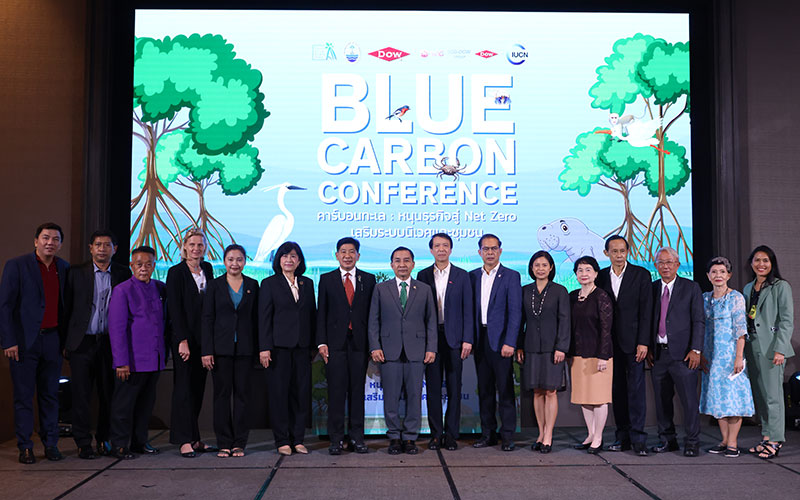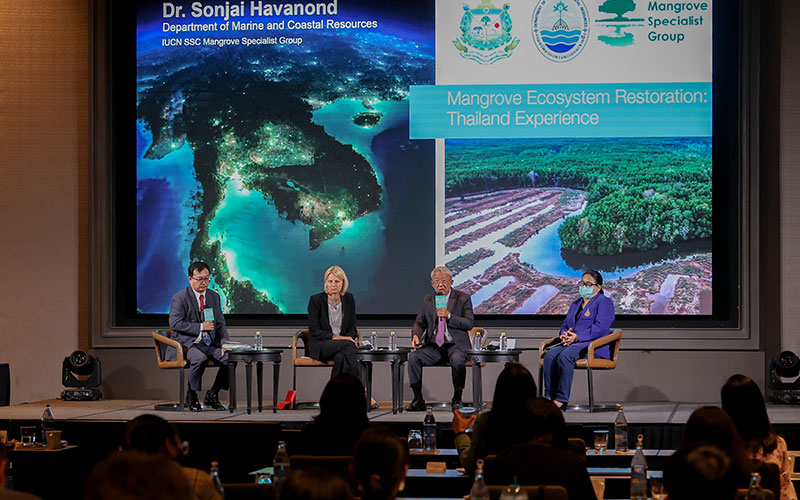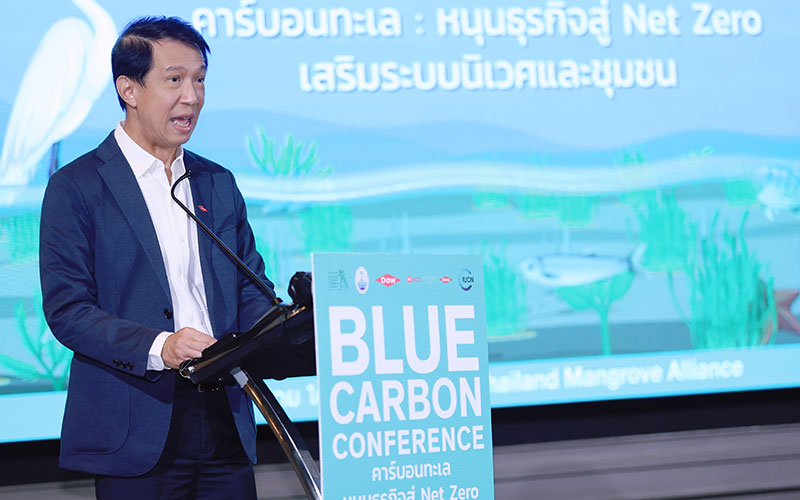BANGKOK – 23 September 2022 - For the first time in Thailand, Dow and partners have invited experts in blue carbon conservation; calling masters of mangrove forests, tidal flats, and seagrass in one forum! Together with the Department of Marine and Coastal Resources (DMCR) and the International Union for Conservation of Nature (IUCN), Dow Thailand has recently organized the Blue Carbon Conference 2022 in Bangkok. The collaboration is an activity of Dow & Thailand Mangrove Alliance led by Dow Thailand Group.

The forum's objective is to brainstorm opinions from government authorities, businesses, academic sectors, NGOs, and local communities to create policy proposals for conserving mangrove forests and seagrass in participative ways. The conference promotes efficient and comprehensive carbon storage, which covers many aspects such as cultivation, nourishing, utilization of areas, creation of sustainable value for communities, and calculation of carbon credits in alignment with international standards. Participants have shared ideas and experiences that can lead to more effective blue carbon preservation, believed to have a carbon storage capacity nearly ten times higher than that of terrestrial ecosystems, leading to a significant number of environmental, economic, and social benefits.

The content of this conference includes blue carbon ecosystem and restoration policies, Mangrove restoration for carbon credit scheme and role of seagrass in carbon sequestration, bodies of knowledge to improve the restoration and conservation of blue carbon areas, communities, and resource management—as well as benefits from the ecosystem, and the roles of the private sector in blue carbon conservation and Thailand's net zero goal. More than twenty expert speakers and more than 150 organizations operating in the conservation of blue carbon areas have joined the forum.
"Blue carbon is defined as the carbon stored in coastal and marine ecosystems. It should not be seen as a single solution but as a connecting of actions for climate mitigation thanks to its many benefits. Looking back at Thailand's commitment to greenhouse gas emission reduction, today is a significant day to inform Thailand on how to prepare itself and, importantly, to connect our blue carbon work to see how the private sector, civil society, and academics can contribute to bringing about state strategies/policies. Much can still be done to achieve the goals," said Dr. Dindo Campilan, Asia Regional Director and Oceania Hub Director of the International Union for Conservation of Nature (IUCN).

"Dow's sustainability targets are to protect the climate, stop plastic waste, and close the recycling loop based on circular economy principles. To address our goals, Dow Thailand has established the Dow & Thailand Mangrove Alliance since 2020 in collaboration with DMCR and IUCN. Currently, we are recognized as Thailand's largest coastal ecosystem conservation network with the highest number of participating members. In addition, we are planning to exchange our experiences with the Global Mangrove Alliance," said Chatchai Luanpolcharoenchai, Dow Thailand President. "We hope this conference increases the appropriate conservation knowledge, brings about new collaborations, and provides opportunities to expand networks among organizations with the same perspectives. This is all to propel the business sector towards carbon neutrality, restore coastal ecosystems, and enhance the local community's economy."
Apichai Ekwanakul, Deputy Director-General of the Department of Marine and Coastal Resources (DMCR), said, "The missions of DMCR are to conserve, restore, protect, and maintain marine and coastal resources, including mangroves. To solve the problems caused by climate change and greenhouse gas emissions, DMCR has established a mangrove plantation project intending for carbon credits. The target term of this project is ten years, from 2022 to 2031, and it will be implemented over an area of 120,000 acres in twenty-three coastal provinces. This year DMCR issued regulations on mangrove plantations for carbon credits for the public and communities, providing opportunities for them to take part in the carbon credit mechanism from mangroves.
The plantation is expected to save the budget for the Thai government up to 600-700 million baht annually and generate income for local people in the areas. The participants shall continue planting and taking care of mangroves for more than ten years, which can effectively restore deteriorated mangrove forest areas while communities are able to make use of them in a sustainable manner."
"In addition to mangrove forests, seagrass resources are considered a blue carbon ecosystem. Seagrass has gained increased attention in Thailand in the past 4-5 years, as it can capture and store a significant amount of carbon dioxide, which is relatively new in the country. At present, there are research works and experiments with seagrass plantations and restoration in many areas. The research findings indicate that cooperation from communities and suitable ecosystems in the area are required to plant seagrass successfully. DMCR would like to say thanks to many private organizations that recognize the importance of this issue and provide precious support, especially Dow Thailand Group, which is a mainstay in organizing the blue carbon forum today,” added Dr. Pornsri Suthanaruk, Deputy Director-General of the Department of Marine and Coastal Resources (DMCR).
This conference is considered a new paradigm for Thailand in terms of information sharing among experts, dissemination of information to interested parties, preparation of policy proposals, and expansion of networks to preserve Thailand's coastal ecosystem in blue carbon areas. The collaboration will be an enabler for Thailand to achieve the goals of carbon neutrality and net zero.
About Dow
Dow (NYSE: DOW) combines global breadth; asset integration and scale; focused innovation and materials science expertise; leading business positions; and environmental, social and governance (ESG) leadership to achieve profitable growth and deliver a sustainable future. The Company's ambition is to become the most innovative, customer-centric, inclusive, and sustainable materials science company in the world. Dow's portfolio of businesses delivers a broad range of differentiated, science-based products and solutions for its customers in high-growth market segments, such as packaging, mobility, infrastructure, and consumer applications. Dow operates 104 manufacturing sites in thirty-one countries and employs approximately 35,700 people. Dow delivered sales of approximately $55 billion in 2021. References to Dow or the Company mean Dow Inc. and its subsidiaries. For more information, please visit www.Dow.com or follow @DowNewsroom on Twitter.
About Dow Thailand Group
Dow started its business in Thailand in 1967, then expanded through a joint venture with SCG in 1987 (in 2022, SCG Chemicals rebranded to SCGC). At present, Dow Thailand Group consists of Dow's wholly owned subsidiaries and SCGC-DOW joint ventures. In addition, there is also a Solvay and Dow joint venture in Thailand. Dow Thailand Group is the largest manufacturing base for Dow in the Asia Pacific, with many manufacturing facilities in Rayong province. Its strategic markets in Thailand are packaging, building and infrastructure, and mobility industries. More information could be found at https://th.Dow.com/en-us or the Thai Facebook www.facebook.com/DowThailandGroup/
For further information, please contact:
Apiradee Poopirom
Dow Thailand Group
Tel. 02-3657296 / 081-8026933
Email:papiradee@Dow.com
Suttipong Krotintakom
Dow Thailand Group
Tel. 038-673315 / 081-7919626
Email:skrotintakom@Dow.com
Lalida, Tisadondilok
Dow Thailand Group
Tel. 02-365-7228 / 089-6687079
Email:lalida@Dow.com
